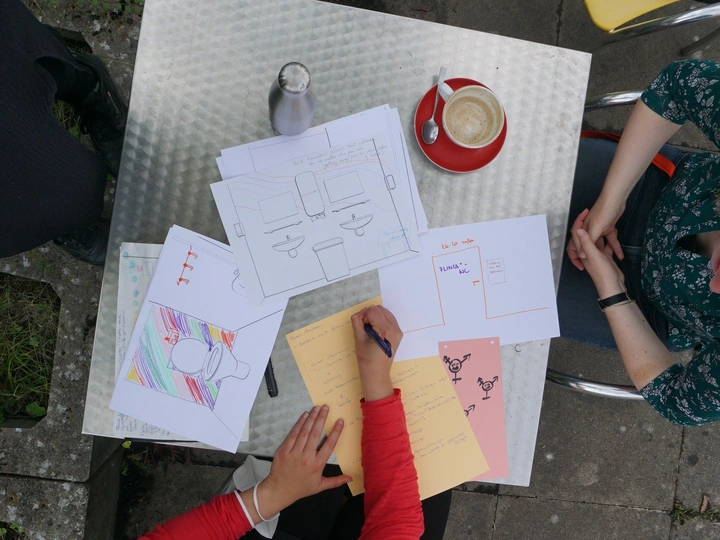space / multual survival / poly-crisis

Claire Jin Deschner
Nina Fräser
come on commons transforms physical and social spaces after incidents of patriarchal and racist violence. We are three bodies, white, Jewish, Brown, mothering, female and butch, situated in Germany. We are coming together across disciplines to find empowering and healing methods of dealing with aftermaths of violence. As we create commons through our work, we are also calling them to transform their social relationships.
Veronica Andres is designer for experimental formats. She creates temporary architectures in public spaces, installations and participatory formats. She is works on academic and community projects in the field of contemporary and historical anti-fascist memorial work. Veronica is pursuing a practice-oriented PhD with the position of research assistant at the Hochschule der Bildenden Künste Saar on the topic of creating alternative spaces for justice.
Claire Jin Deschner is our group facilitator. Their fields of work are conflict mediation, team clarification and collective dealing with internal and external violence in collectives and public institutions. Jins methods are based on the communication psychology and critical organizational research. Jin holds a PhD on anarchist organising from the University of Leicester, UK. Their work focuses on creating conditions for mutual survival. They work at the equal opportunity office at the University of Bremen.
Nina Fraeser is our feminist geographer. She studies collective responses to interpersonal violence through an urban commoning lens centering self-organisation and paths towards justice beyond criminal-legal institutions. In her work she links her current institutional setting being part of an interdisciplinary DFG funded research group on law – gender – collectivity at the Gender Studies Centre at Technical University Berlin to her background in Urban Studies and teaching experience in Urban Design at HCU Hamburg and her feminist-abolitionist anti-violence activism.
"My office loo got vandalized. Of course it did. We are an equal opportunities office. Can you come and help me remake it? Nobody here knows how to deal with it."
We are designing the negotiation of survival in the poly-crisis. Violence is escalating within the environmental crises. Neo-liberal methods of relating to each other deny our dependency on each other for survival. Instead, for our mutual survival, we rely on strategies of healing and transformation, so that we can build sustainable communities that can deal with harm. To create conditions for mutual survival, we adapt spaces in institutions and the public for movement building using experimental design. Our work focuses on impromptu spaces for movement building, where survival has been under threat or neo-fascist, patriarchal and racist violence has already taken place. We do this work situated in post-fascist Germany within the continuously emerging poly-crisis to allow space for conditions of mutual survival.
As LINA fellows for 2023, we would draw onto our experience of redesigning an office toilette into a functional art space after it had been racially and gendered vandalized targeted towards workers in the office. The toilet transformation process did not only offer to heal from the violence that occurred, but also provided the space to transform both the community and the actual toilet space into a more functional version. The process offered the space to let people voice what they needed and allowed them to transform it. Our methodology builds on transformative justice and experimental design, meaning that we use group processes and collaborative spatial design for healing and transformation.
We are now extending our developed methodology to other contexts. As we work on transforming relationships and spaces we ask: How can we care for our different manifestations of vulnerability? How can we joyfully, collectively provide for our needs despite and within the poly-crisis?